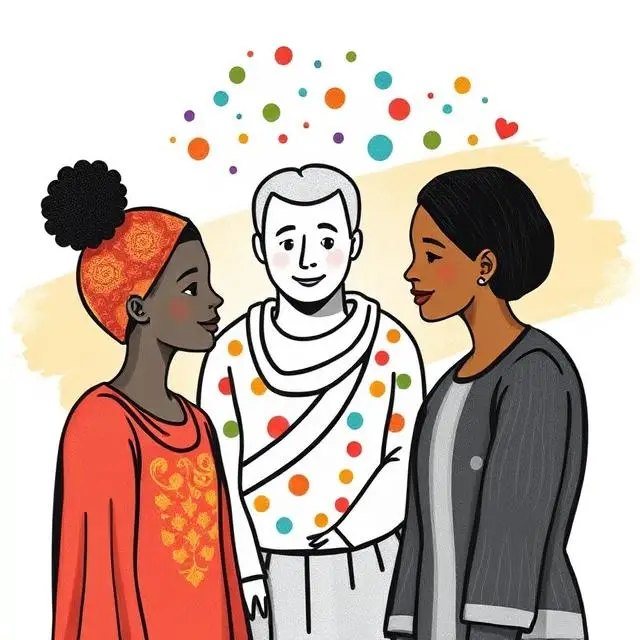Cultural diversity significantly impacts emotional health, shaping how individuals experience and express emotions in diverse societies. In a globalized world where interactions across different cultures are more common than ever, understanding the influence of cultural diversity on emotional well-being has become essential. Embracing multiculturalism can offer emotional benefits such as enhanced empathy, stronger social connections, and exposure to diverse coping mechanisms. However, there are also challenges such as cultural shock, identity struggles, and language barriers that may affect emotional health.
Understanding Cultural Diversity and Emotional Health
What Is Cultural Diversity?
Cultural diversity refers to the presence of different cultural groups within a society, encompassing various ethnicities, languages, traditions, beliefs, and customs. These groups contribute to a rich tapestry of human experience, where each culture brings unique perspectives, practices, and values. In today’s interconnected world, cultural diversity is becoming more pronounced due to global migration, international trade, and digital communication. This diversity creates opportunities for growth, learning, and development but also presents challenges that impact various aspects of life, including emotional health.
The Connection Between Culture and Emotional Well-being
Emotions are deeply influenced by cultural norms, values, and social expectations. Different cultures have distinct ways of expressing emotions, managing stress, and dealing with adversity. For example, in some cultures, it is acceptable to openly express emotions such as sadness or anger, while in others, emotional restraint is valued. These cultural frameworks shape individuals’ emotional responses and coping mechanisms, influencing how they deal with challenges and stressors. Emotional well-being, therefore, is not solely an individual experience but a culturally influenced phenomenon that varies across societies.
Why Emotional Health Matters in a Globalized World
As the world becomes more interconnected, individuals from various cultural backgrounds are increasingly working, living, and interacting with one another. In a multicultural society, understanding the emotional health needs of different cultural groups is vital to ensuring social harmony and individual well-being. Emotional health is crucial for maintaining mental stability, fostering positive relationships, and contributing to overall productivity. When emotional health is nurtured in culturally diverse settings, it can lead to more resilient, empathetic, and socially connected individuals, improving both individual and collective outcomes.
Positive Effects of Cultural Diversity on Emotional Health
Enhanced Empathy and Emotional Intelligence
One of the most significant benefits of cultural diversity is the development of empathy and emotional intelligence. When individuals are exposed to diverse cultural perspectives, they learn to appreciate different emotional expressions and social cues. This exposure fosters empathy, as individuals become more attuned to the emotions and needs of others. Empathy, in turn, enhances emotional intelligence, which is the ability to recognize, understand, and manage one’s own emotions while also understanding the emotions of others. As emotional intelligence grows, so does the ability to form healthier relationships and navigate social interactions more effectively.
Reduced Prejudice and Increased Social Connection
Cultural diversity plays a pivotal role in reducing prejudice and promoting social inclusion. Engaging with individuals from various cultural backgrounds helps challenge stereotypes and misconceptions, allowing people to develop a more nuanced understanding of each other’s lives and experiences. This reduces emotional barriers such as fear, distrust, and social isolation. As prejudice diminishes, individuals are more likely to form meaningful social connections, which are essential for emotional health. Positive social relationships provide emotional support, increase feelings of belonging, and reduce feelings of loneliness or alienation.
Exposure to Different Coping Mechanisms and Resilience Strategies
Different cultures often have unique ways of coping with stress and adversity. Exposure to these varied coping strategies can expand one’s emotional toolkit, offering new approaches to dealing with emotional challenges. For instance, some cultures may emphasize collective coping strategies, such as seeking support from family or community, while others may prioritize individual resilience or spiritual practices. By learning about and adopting diverse coping mechanisms, individuals can enhance their emotional resilience, which is crucial for maintaining emotional health in the face of life’s challenges.

Challenges of Cultural Diversity on Emotional Well-being
Cultural Shock and Emotional Stress
While cultural diversity offers many benefits, it can also lead to challenges that negatively affect emotional health. One common issue faced by individuals in multicultural environments is cultural shock. When people are exposed to a new culture or unfamiliar customs, it can be overwhelming, disorienting, and emotionally taxing. The unfamiliarity of the new cultural context may cause feelings of isolation, confusion, frustration, or sadness. The stress of adapting to a new environment can significantly impact an individual’s emotional well-being, especially if they lack support systems or feel disconnected from their cultural roots.
Identity Struggles in Multicultural Environments
Cultural diversity can also lead to identity struggles, particularly for individuals who belong to multiple cultural groups or who are transitioning between cultures. For example, immigrants or second-generation individuals may experience a sense of displacement or confusion about where they belong. This struggle with cultural identity can lead to emotional stress, feelings of inadequacy, and a lack of self-acceptance. Balancing cultural expectations and norms can be emotionally draining and may cause individuals to experience an internal conflict between their cultural heritage and the dominant culture in their new environment.
Language Barriers and Emotional Isolation
Language barriers are another significant challenge in culturally diverse settings, which can create emotional isolation and hinder effective communication. When individuals are unable to express themselves clearly or understand others, it can lead to frustration, anxiety, and feelings of alienation. The inability to communicate in a shared language can make it difficult to build social connections, seek emotional support, or participate fully in social activities. This emotional isolation can have a detrimental effect on one’s mental health, leading to depression, stress, and a diminished sense of belonging.
How to Foster Emotional Health in Culturally Diverse Settings
Promoting Inclusivity and Open Communication
Creating an inclusive environment where individuals feel valued, heard, and respected is key to fostering emotional health in culturally diverse settings. Open communication is essential for addressing misunderstandings and ensuring that everyone feels safe to express their emotions. Organizations, communities, and educational institutions should actively promote inclusivity through policies, programs, and initiatives that celebrate diversity and encourage dialogue between different cultural groups.
Culturally Sensitive Mental Health Support
In order to effectively address emotional health issues in diverse settings, it is crucial to provide culturally sensitive mental health support. Mental health professionals must be trained to understand the cultural context of their clients’ emotions, beliefs, and coping mechanisms. Providing therapy and support that respects cultural differences ensures that individuals feel understood and supported in a way that aligns with their cultural values. Additionally, providing resources in multiple languages and culturally relevant formats can improve access to mental health services for individuals from diverse backgrounds.
Building Cross-Cultural Emotional Resilience
To foster emotional health in multicultural environments, it is important to build cross-cultural emotional resilience. This involves teaching individuals how to navigate cultural differences, manage cultural stress, and adapt to changing environments. Workshops, training programs, and community-building activities can help individuals develop the skills necessary to thrive emotionally in diverse settings. By focusing on building emotional resilience, individuals can better cope with the challenges of living and working in a multicultural world.
Conclusion: Embracing Diversity for Better Emotional Health
Cultural diversity has a profound impact on emotional health, offering both opportunities and challenges. Embracing and understanding cultural differences can lead to enhanced empathy, stronger social connections, and more effective coping strategies. However, cultural shock, identity struggles, and language barriers can also create emotional stress that requires attention. By fostering inclusivity, providing culturally sensitive mental health support, and building emotional resilience, we can create environments where individuals from diverse backgrounds thrive emotionally. In a globalized world, embracing cultural diversity is not just an ethical imperative but also an essential component of promoting better emotional health for all.
FAQs: The Impact of Cultural Diversity on Emotional Health
1. How does cultural diversity affect emotional health?
Cultural diversity can both positively and negatively impact emotional health. On the positive side, exposure to different cultures enhances empathy, reduces prejudice, and improves emotional intelligence. However, challenges like cultural shock, identity conflicts, and language barriers can cause stress or emotional strain.
2. What are the mental health benefits of living in a culturally diverse society?
Living in a diverse society can:
Boost emotional resilience by exposing individuals to different coping strategies.
Reduce stereotypes and discrimination, leading to better social connections.
Improve adaptability and open-mindedness, which contribute to overall well-being.
3. Can cultural diversity lead to emotional stress? Yes, some people may experience: Culture shock when adapting to unfamiliar norms. Identity struggles when balancing multiple cultural influences. Isolation or loneliness due to language or social barriers. However, these challenges can be managed with support and self-awareness.
4. How can I improve my emotional health in a multicultural environment?
Engage in open-minded conversations to learn from others.
Seek culturally sensitive mental health resources if needed.
Build a support network with people from different backgrounds.
Practice self-reflection to understand your emotional responses to diversity.
5. Where can I find support for emotional struggles related to cultural differences?
Look for multicultural counseling services in your area.
Join diversity and inclusion groups (online or in-person).
Access mental health hotlines that offer multilingual support.

